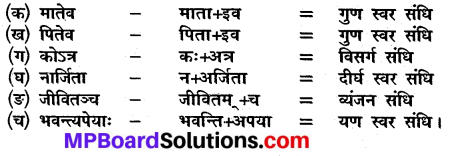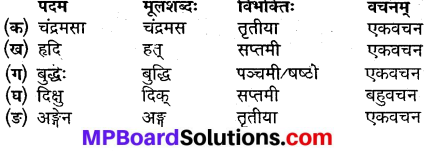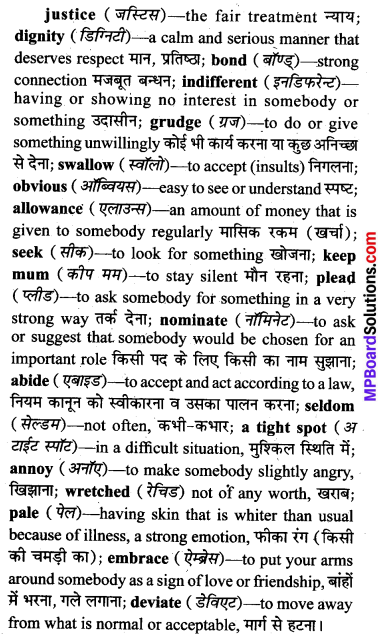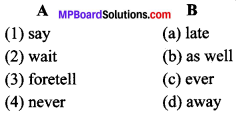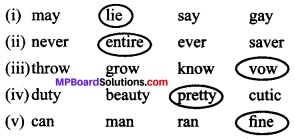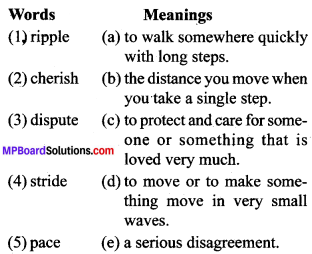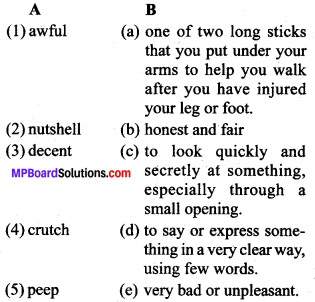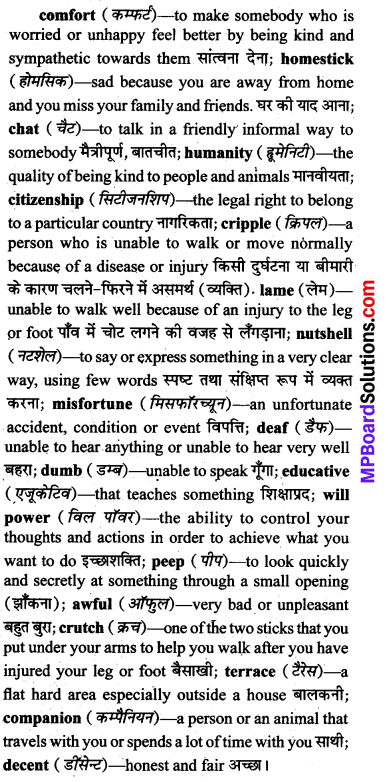MP Board Class 9th Hindi Vasanti Solutions Chapter 3 रसखान पदावली (रसखान)
रसखान पदावली अभ्यास-प्रश्न
रसखान पदावली लघु उत्तरीय प्रश्नोत्तर
प्रश्न 1.
रसखान कहाँ जन्म लेना चाहते हैं और क्यों?
उत्तर
रसखान गोकुल में, गोवर्द्धन पर्वत पर. और यमुना के किनारे कदंब की डाल पर जन्म लेना चाहते हैं। यह इसलिए कि उन्हें अपने इष्टदेव श्रीकृष्ण का दर्शन होता रहे।
प्रश्न 2.
रसखान किस-किस रूप में जन्म लेना चाहते हैं?
उत्तर
रसखान गोकुल गाँव के ग्वालों, नंद की गायों, पत्थर और पक्षी के रूप में जन्म लेना चाहते हैं।
प्रश्न 3.
तीनों लोकों का राज्य कवि किस पर और क्यों न्यौछावर करना चाहता है?
उत्तर
तीनों लोकों का राज्य कवि अपने आराध्य देव श्रीकृष्ण की लकुटी (लाठी) और कामरी पर न्यौछावर करना चाहता है। यह इसलिए कि उसे अपने इष्टदेव श्रीकृष्ण की लकुटी और कामरिया (कामरी) के सामने तीनों लोकों का सुख तुच्छ लगता है।
प्रश्न 4.
गोपियों के छाछ को महत्त्वपूर्ण क्यों बताया गया है?
उत्तर
गोपियों के छाछ को महत्त्वपूर्ण इसलिए बताया गया है कि उससे ही वे अपने प्राण प्यारे कृष्ण को न केवल रिझाती हैं, अपितु नाच भी नचाती हैं।
प्रश्न 5.
कौए को भाग्यशाली क्यों कहा गया है?
उत्तर
कौए को भाग्यशाली कहा गया है। यह इसलिए कि जिस कृष्ण की शोभा पर कामदेव भी अपनी करोड़ों सुंदरताओं को निछावर कर देता है। उस कृष्ण के हाथ से माखन-रोटी छीनकर ले जाना एक अधम पक्षी. कौए का सचमुच में सौभाग्य है।
रसखान पदावली दीर्घ उत्तरीय प्रश्नोत्तर
प्रश्न 1.
कृष्ण को गिरधारी क्यों कहा जाता है?
उत्तर
गिरधारी अर्थात् गिरिधारी। गिरिधारी में दो शब्द हैं-गिरि और धारी। इसका अर्थ है, पर्वत को धारण करने वाला। भगवान श्रीकृष्ण ने इंद्र के क्रोध से ब्रजवासियों की रक्षा करने के लिए गोवर्द्धन पर्वत को अपनी एक अँगुली से उठा लिया था। इसलिए उन्हें गिरधारी (गिरिधारी) कहा जाता है।
प्रश्न 2.
कृष्ण की छवि पर कवि सर्वस्व निछावर करने को तैयार है।’ इस कवन को स्पष्ट कीजिए।
उत्तर
कृष्ण की छवि पर कवि सर्वस्व निछावर करने को तैयार है। इस कथन के आलोक में हम यह कह सकते हैं कि कविवर रसखान कृष्ण के अनन्य उपासक हैं। उनके वे परम भक्त हैं। वे उन्हें अपने इष्टदेव के रूप में स्वीकार कर चुके हैं। हम यह भली-भाँति जानते और समझते हैं कि जो भक्त जिस किसी ईश्वर को अपने प्राणों के समान समझता है। उसके लिए अपने सभी प्रिय वस्तुओं को यहाँ तक कि अपने प्राणों को भी निछावर करने में देर नहीं करता है। इस दृष्टि से यह कृष्ण की छवि पर कविवर रसखान सर्वस्व निछावर करने को तैयार हैं।
प्रश्न 3.
ईश्वर को अनादि और अनंत क्यों कहा गया है?
उत्तर
ईश्वर सभी प्राणियों का रचयिता, पालनकर्ता और संहारकर्ता है। उसकी ही रचना सृष्टि है। सृष्टि का रचनाकार होने के कारण उसको अनादि कहा गया है। उसकी रचना का न कोई आरंभ जानता है, न विस्तार और न अंत ही जानता है। इस दृष्टि से वह अनंत है। इस प्रकार ईश्वर को अनादि और अनंत कहा गया है।
प्रश्न 4.
श्रीकृष्ण के बालरूप का वर्णन कीजिए।
उत्तर
श्रीकृष्ण का बालरूप बड़ा ही अदभुत और आकर्षक है। बालकृष्ण के सिर पर मोर का पंख है। उनके गले में गुंज की माला है। वे पीताम्बर धारण किए हुए हैं। वे लकुटी लिए हुए ग्वालों के साथ गाएँ चरा रहे हैं। वे मुरली की मधुर ध्वनि से सबको मोह रहे हैं। बालक कृष्ण धूल से सने हुए मन को मोह रहे हैं। उनके सिर की बँधी हुई चोटी बहुत सुन्दर लग रही है। वे माखन-रोटी खाते हुए आँगन में इधर-उधर घूम रहे हैं। उनके इधर-उधर घूमने से उनके पैरों की पैंजनी बहुत अच्छी ध्वनि कर रही है। उनकी पीली कछनी मन को छू रही है। उनकी इस अद्भुत सुन्दरता पर रीझकर कामदेव अपनी करोड़ों सुन्दरता को निछावर कर रहा है।
प्रश्न 5.
निम्नांकित पद्यांश की सप्रसंग व्याख्या कीजिए।
(क) मानुष हों तो………….कूल कदंब की डारन।
(ख) सेस महेस, गनेस……………पै नाच नचावें।
(ग) मोरपंखा सिर ऊपर…………….धरी अघरा न घरोंगी।
उत्तर
(क) अगर मुझे दूसरी बार मनुष्य का जन्म प्राप्त हो, तो मैं वहीं जन्म लूँ और अपनी पूरी जिन्दगी वहीं बिता दूँ, जहाँ ब्रज-गोकुल के गाँव के ग्वाल-बाल रहते हैं। अगर मनुष्य जन्म न मिले तो फिर मेरा इसमें तो क्या अधिकार है? अर्थात कुछ भी नहीं है, ऐसा होते हुए यदि मुझे पशु-योनि (जन्म) प्राप्त हो तो मेरी यही इच्छा है कि मैं वहीं जन्म लूँ जहाँ प्रतिदिन बाबा नंद की गाएँ चरती हैं। इन्हीं के बीच में सदैव रहकर मैं अपने जन्म को सार्थक कर सकूँ। यदि यह जन्म भी न मुझे मिले तो फिर क्या? यदि मैं पत्थर भी बनूँ तो मेरी यही हदय की इच्छा है कि मैं उसी गोवर्द्धन पर्वत पर जाकर पत्थर बनूं जिसे भगवान श्रीकृष्ण ने इन्द्र के कोप से रक्षा करने के लिए अपनी एक अँगुली से उठा लिया था। इन सबके बावजूद यदि किसी पक्षी का जन्म मिले तो मेरी यही कामना है कि मैं उस यमुना के तट पर स्थित कदम्ब की डालों पर प्रतिदिन दिन-रात बसा करूँ अर्थात् रहा करूँ
(ख) महाकवि रसखान का कहना है कि जिस परम आराध्य देव श्रीकृष्ण के गुणों का गुणगान, शेषनाग, गणेश, महेश (शिव), सूर्य और इन्द्र निरंतर किया करते हैं, जिस श्रीकृष्ण की अनन्त सत्ता को वेद अपने अल्प और किंचित् ज्ञान के फलस्वरूप अनादि, अनंत, अखंड, अछेद और अभेद बतलाया करते हैं। नारद, शुकदेव और व्यास जैसे मुनि-पंडित भी अपने अनंत प्रयल के बावजूद भी जिसके स्वरूप और गति का पता न लगा सके और अंततः हार-थककर बैठ गए, ऐसे महाप्रभु श्रीकृष्ण को ब्रज के अहीरों की लड़कियाँ छछिया-भर छाछ के लिए बार-बार नाच नचाया करती हैं।
(ग) हे सखी! मैं अपने श्रीकृष्ण के समान ही बनकर उन्हें रिझाने के लिए सिर पर मोर के पंखों को मुकुट के समान धारण कर लूँगी। कृष्ण के समान ही गुंजों की माला को गले में पहल लूँगी। उनके जैसे ही पीले वस्त्रों को पहनकर और हाथ में लकुटी (डंडे) को लेकर वृन्दावन में ग्वाल-ग्वालिनों के साथ गाय को चराती हुई इधर-उधर भटकती फिरूँगी। रसखान कवि कह रहे हैं कि उस प्रेम दीवानी गोपी ने अपनी सखी से यह बिल्कुल स्पष्ट कर दिया है कि हे सखी! मेरे कृष्ण जिस प्रकार से मुझसे रीझ जाएँ, मैं ठीक उसी प्रकार से अपनी वेश-भूषा को धारण करने में तनिक भी संकोच नहीं करूँगी, लेकिन तुम इतना तो निश्चय ही जान लो कि मैं किसी भी दशा में अपनी सौतस्वरूप मुरली को कभी भी अपने होठों पर नहीं रखूगी, नहीं रखूगी। भाव यह है कि गोपी कृष्ण पर हर प्रकार से प्रेम दीवानी होते हुए मुरली रूपी सौत को इस प्रेम का भागीदार होना स्वीकार नहीं कर रही है।
रसखान पदावली भाषा-अध्ययन काव्य-सौंदर्य
प्रश्न 1.
(क) पठित पाठ में फिरौहों, चरौं, करौं आदि ब्रजभाषा के शब्द हैं, इनके अर्व लिखिए।
(ख) महेस, गनेस, दिनेस, सुरेस शब्दों को मानक रूप में लिखिए।
(ग) ‘कोटिन हूँ कलधौत के घाम करील की कुंजनि ऊपर बारो।’ इस पंक्ति में अलंकार बताइए।
उत्तर
(क) ब्रजभाषा के शब्द अर्व
फिरौहौं – फिरूँगी
चरौं – चरूँगा
करौं – करूँगा
(ख) शब्द – मानक रूप
महेस – महेश
गनेस – गणेश
दिनेश – दिनेस
सुरेस – सुरेश
(ग) ‘कोटिन हूँ कलधौत के धाम, करील की कुंजनि ऊपर बारो’ पंक्ति में अनुप्रास अलंकार है।
रसखान पदावली योग्यता-विस्तार
प्रश्न 1. रसखान और सूर के कुछ समाना अर्थी पदों को एकत्र करके उनके अर्थ लिखिए।
प्रश्न 2. रसखान के किसी पद पर कक्षा में लघु नाटिका प्रस्तुत करें।
उत्तर
उपर्युक्त प्रश्नों को छात्र/छात्रा अपने अध्यापक/अध्यापिका की सहायता से हल करें।
रसखान पदावली परीक्षापयोगी अन्य महत्त्वपूर्ण प्रश्नोत्तर
लपूत्तरीय प्रश्नोत्तर
प्रश्न 1.
कवि का कृष्ण के प्रति अनन्य और अटूट भक्ति-भावना कैसे प्रकट हो रही है?
उत्तर
कवि का कृष्ण के प्रति अनन्य और अटूट भक्ति भावना उसके अनेक ‘जन्मों में कृष्ण के ही पास रहने की प्रबल इच्छा से प्रकट हो रही है।
प्रश्न 2.
गोपी कृष्ण का कौन-सा स्वांग नहीं करना चाहती है?
उत्तर
गोपी कृष्ण की मुरली को अपने होठों पर रखने का स्वांग नहीं करना चाहती है।
प्रश्न 3.
कृष्ण अहीर की लड़कियों के छछिया भरी छाछ पर क्यों नाचते हैं?
उत्तर
कृष्ण अहीर की लड़कियों के छछिया भरी छाछ पर इसलिए नाचते हैं कि वे उनके वश में हो चुके हैं।
प्रश्न 4.
राजभवन का सुख पाकर कृष्ण ब्रज को क्यों नहीं भूल पाते हैं?
उत्तर
राजभवन का सुख पाकर कृष्ण ब्रज को नहीं भूल पाते हैं। यह इसलिए राजभवन का सुख उन्हें ब्रज के सुख के सामने बहुत ही फीका और छोटा लगता है।
प्रश्न 5.
कामदेव किस पर क्या न्यौछावर कर रहा है?
उत्तर
कामदेव कृष्ण की बाल सुन्दरता पर रीझकर अपनी करोड़ों सुन्दरता को न्यौछावर कर रहा है।
रसखान पदावली दीर्घ उत्तरीय प्रश्नोत्तर
प्रश्न 1.
रसखान किस-किस रूप में कहाँ-कहाँ जन्म लेना चाहते हैं और क्यों?
उत्तर
रसखान मनुष्य के रूप में गोकुल के गाँव के ग्वालों के यहाँ, पशु के रूप में नंद की गायों में, पत्थर के रूप में गोवर्द्धन पर्वत पर और पक्षी के रूप में यमुना के किनारे कदंब की डालों पर जन्म लेना चाहते हैं। यह इसलिए कि वे अपने इष्टदेव श्रीकृष्ण की निकटता प्राप्त करते रहें।
प्रश्न 2.
कृष्ण अपने बचपन की लकुटी, कामरिया, ब्रज के बन, बाग और तड़ाक, नंद की गायों को चराने और करील के कुंजों के प्रति क्या-क्या निछावर करने के लिए तैयार हैं और क्यों?
उत्तर
कृष्ण अपने बचपन की लकुटी कामरिया ब्रज के वन, बाग और तड़ाग, नंद की गायों को चराने और करील के कुंजों के प्रति तीनों लोकों के सुख, आठों सिद्धियों, नवों निधियाँ और करोड़ों सोने के महलों को निछावर करने के लिए तैयार हैं।
प्रश्न 3.
श्रीकृष्ण का गुणगान निरन्तर करते हुए कौन-कौन पार नहीं पा सके?
उत्तर
श्रीकृष्ण का गुणगान शेषनाग, शिव, गणेश, सूर्य व इन्द्र निरन्तर करते रहते हैं। उनकी अनंत सत्ता को वेद अपने थोड़े-से ज्ञान से अनादि, अनंत, अखंड, अछेद और अभेद बतलाते हैं। नारद, शुकदेव और व्यास जैसे महामुनि भी उनके नाम को रट-रट करके अपनी अनंत कोशिश के बावजूद उनके स्वरूप और गति का पता नहीं लगा सके। इस प्रकार वे उनके विषय में कुछ भी पता लगाने का पार नहीं पा सके।
प्रश्न 4.
‘रसखान-पदावली’ का मुख्य भाव स्पष्ट कीजिए।
उत्तर
‘रसखान-पदावली’ महाकवि रसखान द्वारा विरचित है। उनकी इन प्रस्तुत हुई सवैयों में श्रीकृष्ण के प्रति प्रेमानुराग और अद्भुत सौंदर्य के चित्र हैं। इसके साथ-साथ बाल-लीला का भी बड़ा ही मनोरम दृश्य प्रस्तुत है। कवि ने बार-बार गोकुल में ही जन्म लेने की इच्छा प्रकट की है। इन सवैयों में गोपियों का श्रीकृष्ण के प्रति अगाध प्रेम तो है ही, उन्हें रिझाने के लिए विविध रूपों का स्वांग समर्पण भाव भी है।
रसखान पदावली कवि-परिचय
प्रश्न
कविवर रसखान का संक्षिप्त जीवन-परिचय देते हुए उनके साहित्य के महत्त्व पर प्रकाश डालिए।
उत्तर
जीवन-परिचय-कविवर रसखान का पूरा असली नाम सैयद इब्राहीम था। उनका जन्म 1548 में दिल्ली में हुआ था। उनके बारे में यह कहा जाता है कि उन्होंने गोस्वामी विट्ठलनाथ जी से वल्लभ सम्प्रदाय के अंतर्गत दीक्षा ली थी। उनके काव्य में अच्य वल्लभाचार्य के अनुयायी कृष्ण-भक्त कवियों जैसी प्रेम-माधुरी और भक्ति-शैली से इस बात की पुष्टि होती है। उनके निधन की निश्चित तिथि के विषय में विद्वान एकमत नहीं हैं। अधिकांश विद्वानों ने उनको 85 वर्षों तक जीवित होना स्वीकार किया है। ‘ रचनाएँ-रसखान की निम्नलिखित रचनाएँ हैं
- सुजान रसखान
- प्रेमवाटिका
- दानलीला
- स्फुट छंद और संदिग्ध छंद।
काव्यगत विशेषताएँ-कविवर रसखान की काव्यगत विशेषताएँ मध्यकालीन कवियों में महत्त्वपूर्ण हैं। उन्होंने अपने काव्य में भक्ति के तीनों रूपों को अर्थात् . रूप-वर्णन, विरह-वर्णन और आत्म-समर्पण को चित्रित किया है। इसके लिए रसखान ने ब्रजभाषा और अवधी भाषा के साथ-साथ कुछ अरबी मिश्रित शब्दों के प्रयोग किए हैं। रसखान की शैली भावात्मक और चित्रात्मक दोनों ही है। उसमें गीतात्मकता की प्रधानता है। प्रवाहमय और गतिशील होने के कारण वह अधिक लोकप्रिय है। रसखान के काव्य में रस, छंद और अलंकार की विविधता है।
साहित्यिक महत्त्व-रसखान हिंदी भक्तिकाव्य की कृष्णाश्रयी काव्यधारा के अधिक महत्त्वपूर्ण कवि हैं। फलस्वरूप वे बहुत लोकप्रिय हैं। इनके प्रेम का चित्रण इतना प्रभावशाली है कि उनके पदों को पढ़कर कोई भी गुनगुनाने लगता है। वास्तव में वे प्रेमरस के खान थे।
रसखान पदावली कविता का सारांश
प्रश्न
रसखान द्वारा विरचित ‘सवैया’ के पदों का सार अपने शब्दों में लिखिए।
उत्तर
कविवर रसखान विरचित ‘सवैया’ के पदों में श्रीकृष्ण के प्रति अपार प्रेम की भावना व्यक्त की गई है। इसमें श्रीकृष्ण की अद्भुत सुन्दरता के भी चित्र खींचे गए हैं। श्रीकृष्ण के प्रति अपनी अपार भक्ति भावना को दशति हुए कवि का कहना है कि वह जिस जन्म में हो, वह अपने प्रभु श्रीकृष्ण से यही चाहता है कि उसे वे अपने ही आस-पास उसे विचरने की कृपा प्रदान करें। इस प्रकार वह पहले पद में मनुष्य का जन्म पाकर गोकुल गाँव के ग्वालों के साथ, पशु का जन्म पाकर नंद की गायों के बीच, पत्थर होने पर श्रीकृष्ण द्वारा धारण किए गए मोवर्द्धन पर्वत पर और पक्षी का जन्म पाकर श्रीकृष्ण का प्रिय स्थान यमुना के तट पर विचरण करना चाहता है। दूसरे पद में वह श्रीकृष्ण द्वारा लकुटी-कम्बल पर तीनों लोकों के सुख को, नंद की गायों को चराते हुए आठों सिद्धि और नवों निधि के सुख और ब्रज के वन, बाग, तड़ाग को बार-बार देखते रहने के सुख के सामने करोड़ों सोने के घरों को करील के कंजों के ऊपर निछावर करने के लिए तैयार होने का उल्लेख है।
तीसरे पद में एक गोपी का दूसरे गोपी का श्रीकृष्ण की मुरली के प्रति सौतिया डाह का वह कथन प्रस्तुत है, जिसमें वह श्रीकृष्णमय होने के लिए उनकी ही तरह मोर के पंख, गले में गुंज की माला, पीताम्बर, लकुटी लेकर गायों और गोपियों के साथ घूमने-फिरने के साथ-साथ वह सब कुछ उसके कहने पर करने के लिए तैयार है, लेकिन वह किसी भी दशा में श्रीकृष्ण की तरह मुरली (अपनी सौत) को अपने ओंठ पर नहीं धारण करेगी। चौथे पद में कवि ने जिस श्रीकृष्ण का यशगान सभी देवता और ऋषि-मुनि व वेद-पुराण करते हुए पार नहीं पाते हैं। उन्हें अहीर की लड़कियाँ छाछ रखने के बर्तन भर छाछ के लिए नाच-नचाने का चित्रण किया है। पाँचवें पद में श्रीकृष्ण के अद्भुत बाल-सौंदर्य और बाल-चरित्र का चित्रण करते हुए कवि ने उसे करोड़ों कामदेव की सुंदरता को निछावर करने वाला कहा है।
रसखान पदावली संदर्भ-प्रसंग सहित व्याख्या
पदों की सप्रसंग व्याख्या, काव्य-सौंदर्य एवं विषय-वस्तु पर आधारित प्रश्नोत्तर
1. मानुस हाँ तो वही रसखानि फिरो मिलि गोकुल गाँव के ग्वारन। .
जो पशु हों तो कहा बस मेरो चौं नित नंद की धेनु मँझारन॥
पाहन हों तो वही गिरि को जो धरयो पुर छत्र पुरन्दर धारन ।
जो खग हों तो बसेरो करौं नित कालिन्दी कूल कदम्ब की डारन॥
शब्दार्थ-मानस-मनुष्य। हौं-मैं। बसौं-निवास करूँ। बस-अधिकार। नित-नित्य। मँझारन-बीच में। पाहन-पत्थर । गिरि-गोवर्द्धन पर्वत । पर्यो-धारण किया। पुरन्दर-इन्द्र। खग-पक्षी। कालिन्दी-यमुना। कूल-किनारे।
प्रसंग-प्रस्तुत पद हमारी पाठ्य-पुस्तक ‘वासंती’ हिंदी सामान्य में संकलित व महाकवि रसखान द्वारा विरचित ‘सवैया’ शीर्षक से है। इसमें कवि ने अपने इष्टदेव श्रीकृष्ण के प्रति अपनी स्वतंत्र भक्तिभावना को प्रस्तुत करते हुए कहा है कि
व्याख्या-अगर मुझे दूसरी बार मनुष्य का जन्म प्राप्त हो, तो मैं वहीं जन्म लूँ और अपनी पूरी जिन्दगी वहीं बिता दूँ, जहाँ ब्रज-गोकुल के गाँव के ग्वाल-बाल रहते हैं। अगर मनुष्य जन्म न मिले तो फिर मेरा इसमें तो क्या अधिकार है? अर्थात कुछ भी नहीं है, ऐसा होते हुए यदि मुझे पशु-योनि (जन्म) प्राप्त हो तो मेरी यही इच्छा है कि मैं वहीं जन्म लूँ जहाँ प्रतिदिन बाबा नंद की गाएँ चरती हैं। इन्हीं के बीच में सदैव रहकर मैं अपने जन्म को सार्थक कर सकूँ। यदि यह जन्म भी न मुझे मिले तो फिर क्या? यदि मैं पत्थर भी बनूँ तो मेरी यही हदय की इच्छा है कि मैं उसी गोवर्द्धन पर्वत पर जाकर पत्थर बनूं जिसे भगवान श्रीकृष्ण ने इन्द्र के कोप से रक्षा करने के लिए अपनी एक अँगुली से उठा लिया था। इन सबके बावजूद यदि किसी पक्षी का जन्म मिले तो मेरी यही कामना है कि मैं उस यमुना के तट पर स्थित कदम्ब की डालों पर प्रतिदिन दिन-रात बसा करूँ अर्थात् रहा करूँ।
विशेष-
- इस पद में उन्हीं वस्तुओं का उल्लेख किया गया है जिनसे श्रीकृष्ण का अटूट सम्बन्ध है। इसलिए श्रीकृष्ण के प्रति कवि की पूरी भक्ति-भावना प्रकट होती है।
- ‘बसौ ब्रज-गोकुल गाँव के ग्वारन’ और ‘कालिंदी कूल-कदंब की’ में छेकानुप्रास अलंकार है।
- ‘पाहन हौं तो वही गिरि की जो धर्यो कर छत्र पुरंदर-धारन’ में अंतर्कथा है।
- भाव और भाषा में मधुरता है।
1. पद पर आधारित काव्य-सौंदर्य संबंधी प्रश्नोत्तर
प्रश्न
(i) प्रस्तुत पद के काव्य-सौंदर्य को स्पष्ट कीजिए।
(ii) प्रस्तुत पद के भाव-सौंदर्य को लिखिए।
(iii) प्रस्तुत पद में किसका उल्लेख हुआ है और क्यों?
उत्तर-
(i) प्रस्तुत पद में कवि का विशुद्ध भाव अपने इष्टदेव के प्रति प्रकट हुआ। है। उसे दर्शाने के लिए कवि ने ब्रजभाषा की प्रचलित शब्दावली को अपनाया है। गोवर्द्धन पर्वत का प्रासंगिक उल्लेख करके स्मरण अलंकार को उपयुक्त स्थान दिया गया है। भक्तिरस के प्रवाह से पूरा पद अधिक सरस और हदयस्पर्शी बन गया है।
(ii) प्रस्तुत पद की भाव-योजना आकर्षक है। उसमें प्रवाह है तो सरसता है। रोचकता है तो स्वाभाविकता है। अलंकारों का चमत्कार है, तो कथन की क्रमबद्धता भी है। इस पद के भावों की सुन्दरता निश्चय ही सराहनीय है।
(iii) प्रस्तुत पद में श्रीकृष्ण के निकटवर्ती वस्तुओं और स्थानों का उल्लेख हुआ है। यह इसलिए उनके प्रति कवि की पूरी रुचि और अधिक लगाव है।
2. पद पर आधारित विषय-वस्त से संबंधित प्रश्नोत्तर
प्रश्न
(i) प्रस्तुत पद में किसके प्रति क्या भाव प्रकट हुआ है?
(ii) प्रस्तुत पद का मुख्य भाव क्या है?
उत्तर
(i) प्रस्तुत पद में कवि की अपने इष्टदेव श्रीकृष्ण के प्रति भक्ति-भावना प्रकट हुई है।
(ii) प्रस्तुत पद का मुख्य भाव श्रीकृष्ण के प्रति अनन्य भक्ति-भावना को प्रकट करते हुए उसे प्रेरक बनाना है।
2. या लकुटी अरू कामरिया पर राज तिहूँ पुर को तजि डारौं।
आठहूँ सिद्धि नवो निधि को सुख नंद की गाय चराय बिसाएँ।
रसखानि कबै इन आँखिन तैं ब्रज के बन, बाग, तडाग निहारौं ।
कोटिन हूँ कलधौत के धाम करील की कुंजनि ऊपर बारौं ।
शब्दार्थ-या-उस। लकुटी-लाठी। तिहूँपुर-पृथ्वी, स्वर्ग और पाताल। सिद्ध-अलौकिक शक्ति। आटहुँ सिद्ध-आठ सिद्धियाँ-अणिमा, महिमा, गरिमा, लघिमा, प्राप्ति, प्राकाम्य, ईशित्व और वाशित्व । निधि-अपूर्व भंडार, वैभव । निधियाँ-नौ प्रकार की कही गई हैं-पद, महापद्म, शंख, मकर, कच्छप, मुकुन्द, कुन्द, नील और खर्व ।कोटिक-करोड़ों। कलधौत के घाम-सोने-चाँदी के महल । बारौं-निछावर करता हूँ।
प्रसंग-पूर्ववत् इसमें कवि ने श्रीकृष्ण के ब्रज के प्रति अनन्य प्रेम का उल्लेख करते हुए कहा है।
व्याख्या-द्वारिका में रहते हुए श्रीकृष्ण को एक दिन ब्रज की याद आ गई। वे उससे व्याकुल होकर रुक्मणी से कह रहे हैं कि उस लाठी और कामरी के लिए मैं तीनों लोकों का राज्य भी एकदम छोड़ देने के लिए तैयार हूँ। नंद की गाय चराने के लिए अणिमा, महिमा, गरिमा, लघिमा, प्राप्ति, प्राकाम्य, ईशित्व और वाशित्व-इन आठों सिद्धियों तथा पद्म, महापद्म, शंख, मकर, कच्छप, मुकुन्द, कुन्द, नील और खर्व-इन नवों निधियों के सुख का त्याग करने के लिए तैयार हूँ। जब मैंने अपनी इन आँखों से ब्रज के वन और तालाबों को देखा है, अर्थात् मुझे उनकी याद आई है, तब से मैं उनके लिए इतना आतुर हो गया हूँ कि मैं वैभव के प्रतीक इन करोड़ों सोने-चाँदी के महलों को ब्रज के करील-कुँजों के ऊपर न्यौछावर करता हैं।
विशेष-
- ‘ब्रज के वन-बाग’ और ‘करील की कुंजन’ में अनुप्रास अलंकार है। पूरे पद में मुख्य रूप से स्मरण अलंकार है।
- ब्रजभाषा की शब्दावली है।
- भावात्मक शैली है।
1. पद पर आधारित काव्य-सौंदर्य संबंधी प्रश्नोत्तर
प्रश्न
(i) प्रस्तुत पद के काव्य-सौंदर्य को लिखिए।
(ii) प्रस्तुत पद का भाव-सौंदर्य बताइए।
उत्तर
(i) प्रस्तुत पद का काव्य-सौंदर्य रसात्मक और आलंकारिक है। ब्रज के प्रति कृष्ण के अनन्य प्रेम-भाव को मुख्य रूप से स्मरण अलंकार से अलंकृत करने के प्रयास में अनुप्रास अलंकार को भी जोड़ दिया गया है। ब्रजभाषा की शब्दावली से भावों को पुष्ट करने में सवैया छंद का प्रयोग सार्थक है। इससे पूरा पद आकर्षक बन गया है।
(ii) प्रस्तुत पद का भाव-विधान न केवल स्वाभाविक है अपितु प्रेरक भी। अपने बचपन की याद की व्याकुलता सभी को सब कुछ न्यौछावर कर देने के लिए उकसाती है। इस प्रकार के भाव-चित्र निश्चय ही मन को छूने वाले हैं।
2. पद पर आधारित विषय-वस्तु से संबंधित प्रश्नोत्तर
प्रश्न
(i) उपर्युक्त पद में किसका किसके प्रति भाव प्रकट हुए हैं?
(ii) उपर्युक्त पद का मुख्य भाव क्या है?
उत्तर
(i) उपर्युक्त पद में श्रीकृष्ण का ब्रज के प्रति अनन्य भाव प्रकट हुए हैं।
(ii) उपर्युक्त पद का मुख्य भाव है-जन्मभूमि के प्रति पवित्र और सर्वस्व निछावर कर देने की प्रेरणा-शिक्षा देना है।
3. मोरपंखा सिर ऊपर राखिहाँ, गंज की माल गरे पहिरोंगी।
ओढ़ि पीताम्बर ले लकुटी बन, गोधन ग्वारिन संग फिरॉगी।
भावतों बोहि मेरे रसखानि सो तेरे कहे सब स्वाँग भरोंगी।
या मुरली मुरलीधर की, अघरान-धरी अधरा न धरोंगी।
शब्दार्च-मोरपंखा-मोर के पंख। ओढि-ढ़ककर। पीताम्बर-पीला वस्त्र । लकुटी-लाठी। ग्वारिन-ग्वालिनी। स्वांग-रूप। मुरलीधर-श्रीकृष्ण । अधरा-होंठों पर। घरौंगी-धारण करूँगी।
प्रसंग-पूर्ववत् । श्रीकृष्ण के प्रेम में डूबी हुई एक गोपी अपनी एक प्रिय सखी से इस प्रकार कह रही है कि
व्याख्या-हे सखी! मैं अपने श्रीकृष्ण के समान ही बनकर उन्हें रिझाने के लिए सिर पर मोर के पंखों को मुकुट के समान धारण कर लूँगी। कृष्ण के समान ही गुंजों की माला को गले में पहल लूँगी। उनके जैसे ही पीले वस्त्रों को पहनकर और हाथ में लकुटी (डंडे) को लेकर वृन्दावन में ग्वाल-ग्वालिनों के साथ गाय को चराती हुई इधर-उधर भटकती फिरूँगी। रसखान कवि कह रहे हैं कि उस प्रेम दीवानी गोपी ने अपनी सखी से यह बिल्कुल स्पष्ट कर दिया है कि हे सखी! मेरे कृष्ण जिस प्रकार से मुझसे रीझ जाएँ, मैं ठीक उसी प्रकार से अपनी वेश-भूषा को धारण करने में तनिक भी संकोच नहीं करूँगी, लेकिन तुम इतना तो निश्चय ही जान लो कि मैं किसी भी दशा में अपनी सौतस्वरूप मुरली को कभी भी अपने होठों पर नहीं रखूगी, नहीं रखूगी। भाव यह है कि गोपी कृष्ण पर हर प्रकार से प्रेम दीवानी होते हुए मुरली रूपी सौत को इस प्रेम का भागीदार होना स्वीकार नहीं कर रही है।
विशेष-
- ‘सौतिया डाह’ नामक नारी सुलभ स्वभाव का कवि ने सजीव और रोचक चित्र प्रस्तुत किया है।
- अनुप्रास अलंकार की सुन्दर योजना है।
- चित्रात्मक शैली है, और भाषा ब्रजभाषा है।
- गोपी का सच्चा प्रेम चित्रित हुआ है।
1. पद पर आधारित काव्य-सौंदर्य संबंधी प्रश्नोत्तर
प्रश्न
(i) प्रस्तुत पद के काव्य-सौंदर्य पर प्रकाश डालिए।
(ii) प्रस्तुत पद का भाव-सौंदर्य स्पष्ट कीजिए।
(iii) गोपी ने क्या धारण करने से मना कर दिया और क्यों?
उत्तर
(i) प्रस्तुत पद में श्रीकृष्ण की एक अनन्य प्रेमिका गोपी के भावों को कवि ने ब्रजभाषा की शब्दावली से पुष्ट करके उसे अनुप्रास अलंकार से चमत्कृत करने का सार्थक प्रयास किया है। इसके लिए प्रस्तुत हुआ शृंगार रस का प्रवाह बड़ा ही सुंदर है। चित्रात्मक शैली से यह अंश अधिक आकर्षक बन गया है।
(ii) प्रस्तुत पद का भाव-सौंदर्य स्वाभाविक रूप में है। गोपी का कृष्ण के प्रति उमड़ा हुआ प्रेम सात्त्विक और विशुद्ध भावों का है। कृष्ण का स्वांग करने वाली गोपी का कृष्ण की मुरली के प्रति सौतिया डाह नारी स्वभाव के अनुकूल है।।
(iii) गोपी ने अपने होठों पर कृष्ण की मुरली को धारण करने से मना कर दिया है। यह इसलिए कि वह उसे अपनी सौत समझती थी।
2. पद पर आधारित विषय-वस्तु से संबंधित प्रश्नोत्तर
प्रश्न
(i) उपर्युक्त पद का मुख्य भाव क्या है?
(ii) गोपी ने कृष्ण का स्वांग करने के लिए क्यों कहा?
उत्तर
(i) उपर्युक्त पद का भाव यह है कि कृष्ण का सौंदर्य अद्भुत है। इसलिए वह रोचक है। इसे दर्शाना ही उपर्युक्त पद का मुख्य भाव है।
(ii) गोपी ने कृष्ण को रिझाने के लिए ही उनका स्वांग करने के लिए कहा।
4. सेस महेस गनेस दिनेस सुरेसहू जाहि निरंतर गावें।
जाहि अनादि अनन्त अखंड अछेद अभेद सुवेद बतावें।
नारद लै सुक व्यास रटे पचिहारे तऊ पुनि पार न पावें।
ताहि अहीर की छोहरियों छछिया भरि छाछि पै नाच नचावें।
शब्दार्थ-सेस-शेषनाग। गनेस-गणेश। महेस-शिव । दिनेस-सूर्य । सुरेस-इन्द्र। जाहि-जिसके। अभेद-भेदरहित। अछेद-अमर। अभेद-जिसका रहस्य न जाना जा सके। पचि-कोशिश करके।
प्रसंग-प्रस्तुत सवैया रीतिकालीन रीतिमुक्त काव्यधारा के महत्त्वपूर्ण महाकवि ‘रसखान द्वारा विरचित है। इसमें महाकवि रसखान ने अपने इष्टदेव भगवान श्रीकृष्ण की अद्भुत प्रेममय उदारता और भक्त-वत्सलता का चित्ताकर्षक चित्रण किया है।
व्याख्या-महाकवि रसखान का कहना है कि जिस परम आराध्य देव श्रीकृष्ण के गुणों का गुणगान, शेषनाग, गणेश, महेश (शिव), सूर्य और इन्द्र निरंतर किया करते हैं, जिस श्रीकृष्ण की अनन्त सत्ता को वेद अपने अल्प और किंचित् ज्ञान के फलस्वरूप अनादि, अनंत, अखंड, अछेद और अभेद बतलाया करते हैं। नारद, शुकदेव और व्यास जैसे मुनि-पंडित भी अपने अनंत प्रयल के बावजूद भी जिसके स्वरूप और गति का पता न लगा सके और अंततः हार-थककर बैठ गए, ऐसे महाप्रभु श्रीकृष्ण को ब्रज के अहीरों की लड़कियाँ छछिया-भर छाछ के लिए बार-बार नाच नचाया करती हैं।
विशेष-
- संपूर्ण पद में क्रमशः अंत्यानुप्रास, छेकानुप्रास और वृत्यानुप्रास अलंकार की सुंदर योजना है।
- संपूर्ण पद में भक्ति और श्रृंगार रस का सुंदर प्रवाह है।
1. पद पर आधारित काव्य-सौंदर्य संबंधी प्रश्नोत्तर
प्रश्न
(i) प्रस्तुत पद के काव्य-सौंदर्य पर प्रकाश डालिए।
(ii) प्रस्तुत पद का भाव-सौंदर्य स्पष्ट कीजिए।
(iii) प्रस्तुत पद में कृष्ण के किस रूप का चित्रण किया गया है?
उत्तर
(i) प्रस्तुत पद में कृष्ण के असाधारण और सामान्य रूप को चित्रित करने के लिए कवि ने अनुप्रास अलंकारों की झड़ी लगा दी हैं। पूरे पद को हृदयस्पर्शी बनाने के लिए भक्ति रस और शृंगार रस के मिश्रित प्रयोग सचमुच में अनूठे हैं।
(ii) प्रस्तुत पद की भाव-योज़ना पद भक्ति-भावना आधारित है। भाव बड़े ही – चित्ताकर्षक और रोचक होने के साथ गतिशील और विविध हैं।
(iii) प्रस्तुत पद में कृष्ण को दो रूपों में चित्रित किया है-परब्रह्म और गोपियों के प्रेमी के रूप में।
2. पद पर आधारित विषय-वस्तु से संबंधित प्रश्नोत्तर
प्रश्न-
(i) कृष्ण के परस्पर अलग-अलग स्वरूपों के चित्रण से कवि क्या दर्शाना चाहता है?
(ii) श्रीकृष्ण को ब्रज के अहीरों की लड़कियाँ छछिया-भर छाछ के लिए क्यों नचाया करती हैं?
उत्तर
(i) कवि कृष्ण के परस्पर अलग-अलग स्वरूपों के चित्रण से उनके प्रति अपनी अनन्य भक्ति-भावना को दर्शाना चाहता है।
(ii) श्रीकृष्ण को ब्रज के अहीरों की लड़कियाँ छछिया-भर छाछ के लिए नचाया करती हैं। यह इसलिए कि इससे उन्हें कृष्ण के प्रति अनन्य प्रेमरस का आनंद प्राप्त होता है।
5. धूरि भरे अति सोभित स्यामंज, तैसी बनी सिर सुन्दर चोटी।
खेलत खात फिरें अंगना, पग पैंजनी बाजति पीरी कछोटी।
वा छवि को रसखानि विलोकत, वारत काम कलानिधि कोटी।
काग के भाग बड़े सजनी, हरि साथ सों ले गयो माखन रोटी।
शब्दार्व-पूर-धूल । स्याम-श्रीकृष्ण । अंगना-आँगन। छवि-सौंदर्य । विलोकत-देखते ही। वारत-निछावर। कोटी-करोड़ों। काग-कौआ।
प्रसंग-पूर्ववत्। एक गोपी अपनी प्रिय सखी से अपने प्राण-प्यारे श्रीकृष्ण के रूप-सौंदर्य का उल्लेख करते हुए कह रही है कि
व्याख्या-कोई गोपी अपनी सखी से कृष्ण की सुंदरता का वर्णन करती हुई कहती है कि धूल से सने हुए शरीर वाले श्रीकृष्ण अत्यंत शोभायमान थे। ऐसी ही शोभा से युक्त उनके सिर की सुंदर चोटी बनी हुई थी। वे खेलते हुए और माखन, रोटी खाते हुए अपने आँगन में घूम रहे थे। उनके पैरों की पैंजनी बज रही थी। वे पीली लंगोटी पहने हुए थे। उनकी उस समय की शोभा को देखकर कामदेव भी अपनी करोड़ों संदरताओं को उस पर न्यौछावर कर रहा था। हे सखि! उस कौवे का बहत बडा सौभाग्य है जो कृष्ण के हाथ से माखन-रोटी झपटकर उड़ गया।
विशेष-
- कृष्ण की बाल-लीला का सुंदर एवं स्वाभाविक वर्णन है।
- ‘वा छवि को ‘रसखानि’ विलोकत, वारत काम कला निधि कोटी’ में व्यतिरेक अलंकार है।
- पाठान्तर-चतुर्थ पंक्ति का यह पाठ भी मिलता है।’काग के भाग कहा कहिए हरि हाव सों ले गयो माखन-रोटी।’
1. पद पर आधारित काव्य-सौंदर्य संबंधी प्रश्नोत्तर
प्रश्न
(i) प्रस्तुत पद के काव्य-सौंदर्य पर प्रकाश डालिए।
(ii) प्रस्तुत पद का भाव-सौंदर्य स्पष्ट कीजिए।
(iii) श्रीकृष्ण का सौंदर्य कैसा हैं?
उत्तर
(i) प्रस्तुत पद का काव्य-सौंदर्य अनूठा है। यह इसलिए कि उसमें अनुप्रास अलंकार का चमत्कार है, तो शृंगार रस का तीव्र प्रवाह है। चित्रात्मक शैली से सवैया छंद अधिक मनमोहक हो गया है।
(ii) प्रस्तुत पद का भाव-सौंदर्य बाल-स्वभाव के चित्रों से अधिक आकर्षक है बालक कृष्ण का बाल-चरित्र न केवल रिझाने वाला है वरन् उसमें गति, ओज और क्रमबद्धता है।
(iii) श्रीकृष्ण का सौंदर्य कामदेव की करोड़ों सुंदरता को लज्जित करने वाला है।
2. पद पर आधारित विषय-वस्तु से संबंधित प्रश्नोत्तर
प्रश्न
(i) उपर्युक्त पद में कृष्ण के किस रूप का चित्रण हुआ है?
(ii) उपर्युक्त पद का भाव स्पष्ट कीजिए।
उत्तर-
(i) उपर्युक्त पद में कृष्ण के बाल-रूप का अत्यधिक भावपूर्ण चित्रण हुआ है।
(ii) उपर्युक्त पद का भाव सरल किंतु आकर्षक है। बालक कृष्ण की बाल-लीला का स्वाभाविक, विश्वसनीय और यथार्थमय चित्रण है। इसके द्वारा कवि ने अपनी अनन्य भक्ति-भावना करते हुए इसे प्रेरक स्वरूप प्रदान किया है।

